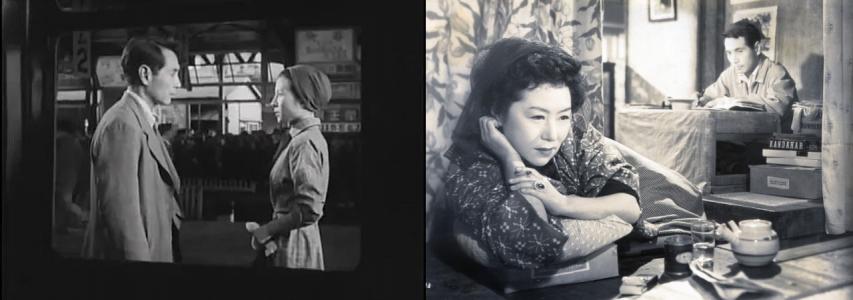Upcoming Events
ARCHIVED Film Gathering: Love Letter by Kinuyo Tanaka + post-screening discussion

Date
Saturday 6 November 2021
Time
12.30pm (GMT)
Venue
BFI Southbank
Belvedere Rd
London SE1 8XT
Booking Details
No booking required, but please book your own tickets for the film here and let us know you are attending via email (events@japansociety.org.uk) by Thursday 4 November, so we can send you our meeting point for the post-screening discussion.
Taking the opportunity given by the return of BFI Japan 2021, a two-part season celebrating the illustrious history of Japanese cinema at BFI Southbank, we are pleased to invite a small group of members and friends to gather to watch the film Love Letter directed by Kinuyo Tanaka in 1953 on Saturday 6 November at 12.30pm.
This will be a special occasion to meet in person again, and following the film, to get together to discuss it in a cordial and relaxed atmosphere. After the screening, we will gather in a previously arranged location and head to a nearby cafe to enjoy an informal conversation about the film over drinks and/or food (orders will be at your own discretion 'pay as you order').
We are not providing tickets for the film so please book your own tickets online on the BFI website or by calling the box office on 020 7928 3232, subject to availability (please note that the box office counter at BFI Southbank remains closed until further notice).
Take advantage of the BFI discount code and enjoy 2 tickets for the price of 1 - simply quote JAPAN241 when booking your tickets!
Love Letter (恋文, Koibumi, 1953) is the first film as director of star Kinuyo Tanaka. Based on a novel by Fumio Niwa, with a script written by filmmker Keisuke Kinoshita, the film is a romantic melodrama set just after the end of the Allied Occupation (1945-1952). The protagonist, Reikichi (played by Masayuki Mori), is a repatriated soldiers who struggles to adapt to the post-war society and lives with her young brother in Tokyo. He works as a translator of love letters from Japanese women to the American GIs they met during the Occupation but is unable to forget her childhood love Michiko (Yoshiko Kuga) who was forced to married another man in their hometown before the war. Knowing she is now a widow, he looks for her in the streets of Tokyo but the destiny will bring them together in an unexpected place.
Kinuyo Tanaka (1909-1977) is one of the most celebrated stars in the history of Japanese cinema. She played female roles in over 250 films and collaborated with the most important directors of her time (Yasujiro Ozu, Mikio Naruse, Heinosuke Gosho, Keisuke Kinoshita, and Hiroshi Shimizu, among others). Tanaka entered the film world in 1924 when she was 14 years old and was hired as an actress by Shōchiku studio. By the 1930s she has already become one of the most representative stars of the studio, participating in the first successful Japanese talkie, The Neighbor’s Wife and Mine (1931), and gaining audience favor through her roles in romantic melodramas such as The Dancing Girl of Izu (1933), Okoto to Sasuke (1935), and The Love-Troth Tree (1938-39). Tanaka worked exclusively for Shōchiku until 1950, when she became a freelance actress, overlapping a period of profound transformation in Japan, particularly for women. In 1940 she began a successuful 15-year collaboration with director Kenji Mizoguchi working together in critically acclaimed films such as The Life of Oharu (1952), Ugetsu (1953), and Sansho the Bailiff (1954). In the post-war period, Tanaka herself became a film director and made six feature films between 1953 and 1962. She was the only female director active during the post-war Golden Age of Japanese cinema in the late 1950s and her films highlighted women's lives tackling unexplored topics such as breast cancer and women’s colonial experiences and questioning social issues such as female prostitution and women’s sexuality from an incisive perspective. Her outstanding career in front of and behind the camera accompanies the history of Japanese cinema, from the silent era until the late 1970s embodying the socio-political and cultural changes of Japanese society and women's experiences.
Booking is not required for this event, but please let us know you are attending via email (events@japansociety.org.uk) by Thursday 4 November, so we can send you our meeting point for the post-screening discussion.
If you have any questions, please call the Japan Society office on 020 3075 1996 or email events@japansociety.org.uk.

